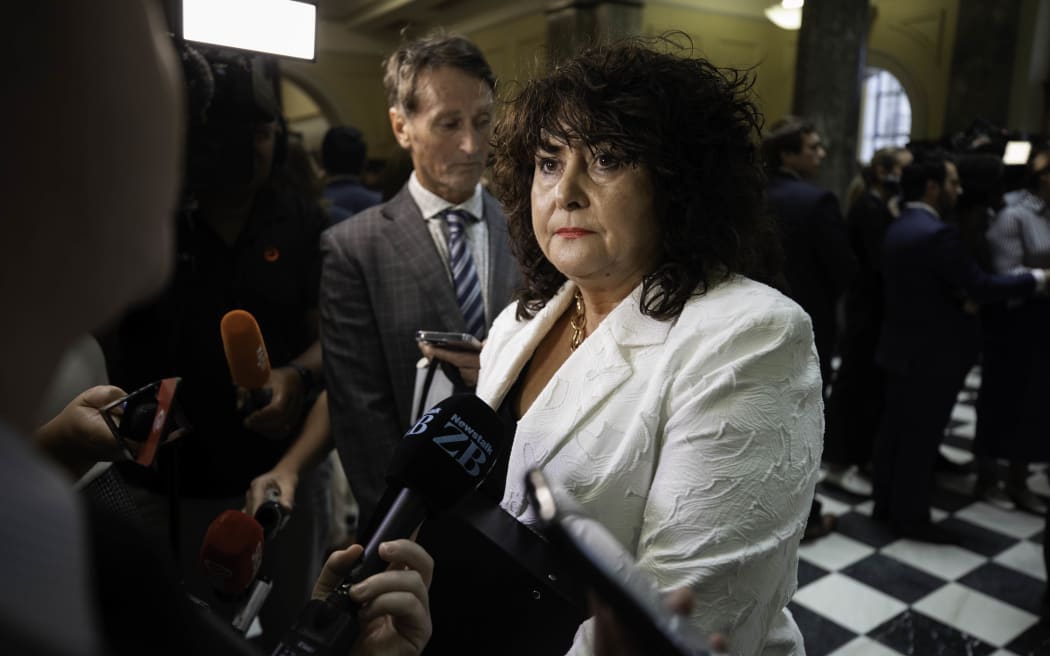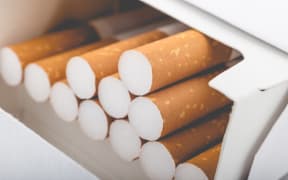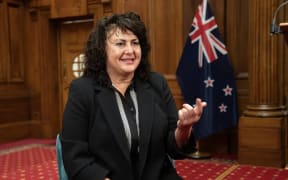
Photo: RNZ / Angus Dreaver
Health officials urged the government to retain key aspects of the smokefree law it plans to repeal, confidential briefings to Associate Health Minister Casey Costello reveal.
Costello plans to scrap the current law, which would slash tobacco retailers from 6000 to 600, remove 95 percent of the nicotine from cigarettes and create a smokefree generation by banning sales to anyone born after 2009.
In documents obtained by RNZ, the Health Ministry urged Costello to keep elements of the current law, which the briefings said was an "endgame" for the tobacco industry in New Zealand.
The new law was passed under the previous government but major aspects of it are not due to come into force until this year and 2025.
Officials provided Costello with multiple compromise options - including introducing a purchase age of 25 - which they said would have saved lives and money.
Costello rejected all of them.
RNZ revealed that notes were sent from Costello's office to health officials proposing a three-year freeze on tobacco excise.
One of the government's justifications for overturning the smokefree laws is the claim that it would expand the black market and increase other criminal activity associated with tobacco.
But the latest briefings RNZ has obtained said such messages came straight from the tobacco industry playbook.
"A common tobacco industry tactic is to assert that tobacco policies will increase an illicit market," the documents said. "The assertion of an increased illicit market is used to oppose tobacco control measures such as excise tax increases."
Health officials said independent investigation of tobacco industry-funded studies revealed "numerous problems with the data collection, analysis and presentation resulting in inflated estimates of illicit tobacco trade".
The evidence pointed the opposite way, the briefings said. "The research has so far found evidence of a decreasing illicit trade in tobacco in New Zealand over the past 10 years. Illicit trade accounted for an estimated 8.4 percent of the tobacco market in 2022."
The documents said crime would also reduce under provisions in the current law to limit the nicotine in cigarettes to 0.8mg/g from April 2025 - a 95 percent reduction from the current levels of about 15 mg/g.
"The low nicotine policy was also expected to significantly reduce the incentive to steal tobacco from approved retailers," the documents say.
"The combination of these polices was therefore expected to reduce the overall risk of crime through fewer targets, more robust security processes, and a less appealing product."
Very low nicotine levels reduce the "appeal and addictiveness" of cigarettes, the documents said. Scrapping the move would mean ongoing nicotine dependence among smokers "and the associated morbidity and mortality".
As a compromise, officials suggested Costello introduce a nicotine limit of 1.3mg/g, which they said "may still be effective at achieving adequate quit rates", but she rejected that option.
Reducing retailers, banning sales near schools rejected
Health officials also urged the minister to retain laws allowing only approved retailers to sell tobacco from this July.
The current law would limit approval to 600 outlets, who had until December last year to apply. It also introduced a "fit and proper person" test, security standards and staff training to prevent under-age sales.
"Security standards and business system requirements will ensure that retailers have appropriate protection from crime and ram raids and are likely to be high quality operators," the documents said.
Health officials told Costello that, if she opposed reducing the number of retailers to 600 stores, she could consider a higher cap or a sinking lid policy, but she rejected that advice.
The papers show Costello also rejected suggestions of "proximity controls", which would have banned tobacco being sold near schools or other areas of community interest.
The briefings to Costello described the smokefree law introduced by the last government as an "endgame package" to make tobacco "less accessible, appealing and addictive".
Without those changes, New Zealand "will not achieve the goal of less than 5 percent smoking rates for all population groups until 2061", they said.
The documents said an average of 12 New Zealanders die from smoking every day. The current law was predicted to save $5.25 billion in health spending and nearly $6b in increased productivity over the lifetimes of New Zealanders alive in 2020.
Officials also urged Costello to consider the consequences of overturning the smokefree generation policy.
"The risk of reversing this provision is that ongoing generations continue to take up smoking. This risk is exacerbated if the low nicotine policy is also reversed - from what we know about addiction it is much easier to prevent than to stop once addicted."
Officials suggested a compromise position of banning tobacco sales to under-25s, as "there is strong evidence that starting smoking after 25 is uncommon".
But again Costello rejected that option, despite officials telling her that even smokers supported the smokefree generation policy. "A New Zealand study of people who smoke or have recently quit smoking found over 75% support the smokefree generation policy."
Costello did not answer questions posed by RNZ.
Via a spokesperson, she said the government's 100-day plan included a commitment to repeal the most recent smokefree laws. "I'm about to introduce legislation to do that. I'll be talking to that legislation after it's introduced."
Costello under pressure to explain origin of replacement policies
The new material obtained by RNZ comes after the Health Ministry said last week it had terminated the employment of a staff member it claimed had been leaking information.
A series of media revelations has put pressure on Costello to explain why her comments in the media have been at odds with the contents of official documents.
When RNZ asked Costello in January whether she was proposing a three-year freeze on tobacco excise she claimed she had not considered it.
"I've had no discussions on that at all. Like, that's - it's not even something I specifically sought advice on," she told RNZ. "I haven't looked at a freeze on the excise at all."
But a Health Ministry document, sent to Costello, said the minister was proposing to freeze the excise tax. "The additional information you provided to us proposed also to freeze the excise on smoked tobacco for three years," the document says.
Costello's office had sent a document to the Health Ministry proposing ideas to help develop a law to replace Labour's smokefree plans.
The document included the idea of freezing the excise tax and also the claim that nicotine was no more harmful than caffeine.
The notes sent by Costello to the Ministry of Health also make the case against reducing the number of tobacco retailers. "This too will just lead to the gangs selling cigarettes. We support small business for whom cigarettes are a major source of income."
But Costello has said she did not write the document.
In an interview with Mike Hosking on Newstalk ZB, Costello said the document was an "extraction of a whole lot of historical documents - it was sitting around and [someone] just compiled them all into one big list".
She didn't know who wrote the document, she said. "I'm not sure who put it on my desk."
RNZ filed an Official Information Act request asking for all documents sent, held or received by Costello on tobacco and vaping policy but she refused to release any documents, citing a clause in the OIA protecting confidential advice tendered by ministers and officials.
The documents obtained by RNZ said that to have a new law in place by March, Costello would need to introduce a bill this month and pass it under urgency, meaning it would not be subject to full select committee scrutiny.
Retailers had to be licensed by mid-year under the current law but the approved retailer scheme was suspended in December after the new government came in.
"If the changes to the Smokefree Act requiring approval to sell smoked tobacco products are not repealed before 1 July 2024 there is a risk of no or limited legal supply of smoked tobacco in New Zealand due to a lack of approvals."





